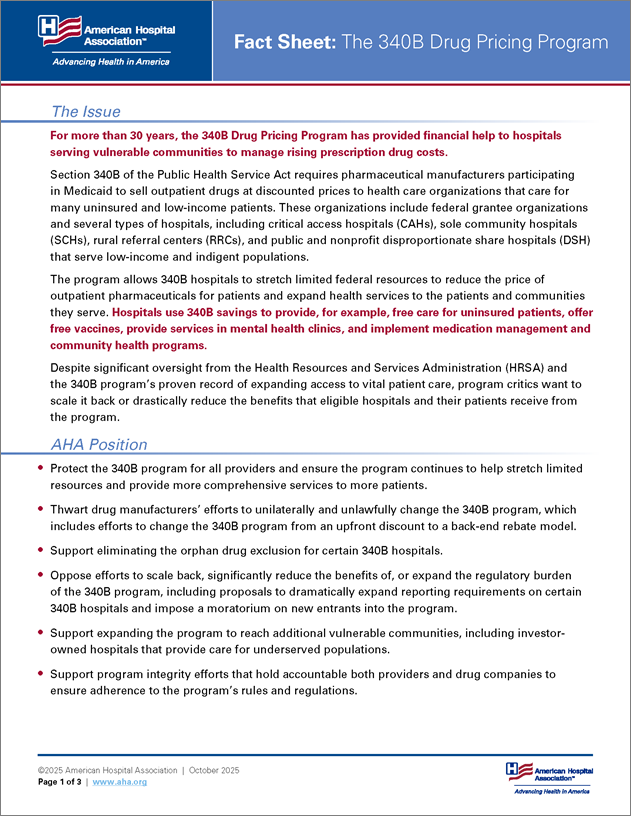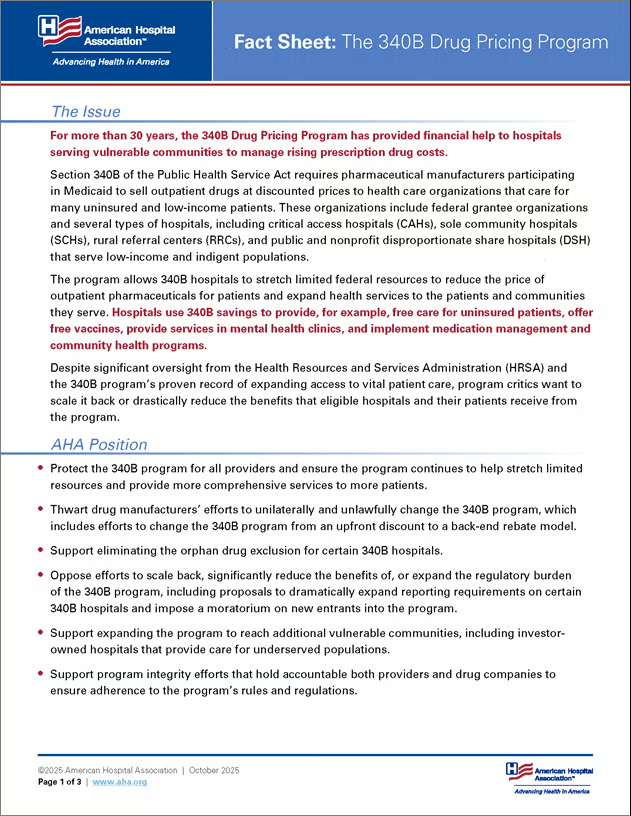

Fact Sheet: The 340B Drug Pricing Program
October 2025
The Issue
For more than 30 years, the 340B Drug Pricing Program has provided financial help to hospitals serving vulnerable communities to manage rising prescription drug costs.
Section 340B of the Public Health Service Act requires pharmaceutical manufacturers participating in Medicaid to sell outpatient drugs at discounted prices to health care organizations that care for many uninsured and low-income patients. These organizations include federal grantee organizations and several types of hospitals, including critical access hospitals (CAHs), sole community hospitals (SCHs), rural referral centers (RRCs), and public and nonprofit disproportionate share hospitals (DSH) that serve low-income and indigent populations.
The program allows 340B hospitals to stretch limited federal resources to reduce the price of outpatient pharmaceuticals for patients and expand health services to the patients and communities they serve. Hospitals use 340B savings to provide, for example, free care for uninsured patients, offer free vaccines, provide services in mental health clinics, and implement medication management and community health programs.
Despite significant oversight from the Health Resources and Services Administration (HRSA) and the 340B program’s proven record of expanding access to vital patient care, program critics want to scale it back or drastically reduce the benefits that eligible hospitals and their patients receive from the program.
AHA Position
- Protect the 340B program for all providers and ensure the program continues to help stretch limited resources and provide more comprehensive services to more patients.
- Thwart drug manufacturers’ efforts to unilaterally and unlawfully change the 340B program, which includes efforts to change the 340B program from an upfront discount to a back-end rebate model.
- Support eliminating the orphan drug exclusion for certain 340B hospitals.
- Oppose efforts to scale back, significantly reduce the benefits of, or expand the regulatory burden of the 340B program, including proposals to dramatically expand reporting requirements on certain 340B hospitals and impose a moratorium on new entrants into the program.
- Support expanding the program to reach additional vulnerable communities, including investorowned hospitals that provide care for underserved populations.
- Support program integrity efforts that hold accountable both providers and drug companies to ensure adherence to the program’s rules and regulations.
Why?
- 340B-eligible hospitals are the safety-net for their communities. The 340B program allows eligible hospitals to further stretch their resources and provide additional benefits and services. These hospitals care for a significant share of the nation’s underserved populations including children, cancer patients living with cancer, and those living in rural communities.
- The 340B program generates valuable resources for eligible hospitals to maintain, improve and expand access to programs that improve the health and well-being of patients and communities. In 2022 alone, 340B hospitals provided nearly $100 billion in benefits to their communities which was a 47% increase from 2019. Without the financial support from the 340B program, communities in need across the country could lose access to valuable, lifesaving care.
- The 340B program is a small program with big benefits. Though the 340B program has grown over time, it remains a small share of drug company revenues. In 2022, the discounts provided under the 340B program accounted for only 3% of drug companies’ global revenues. Moreover, growth of the program has been driven by decisions made by drug companies to increase drug prices and introduce new drugs into the market at record-high prices. In addition, broader changes in health care such as the increased reliance on specialty drugs, the shift away from inpatient care to outpatient care, and the substitution of complex and invasive surgeries in favor or drug therapies have all contributed to growing the program. Nevertheless, the program remains small relative to the benefits it provides to patients and communities across the country.
- The 340B Program is not a rebate program. In yet another attempt to diminish the program, several drug companies are attempting to convert the way covered entities access discounted 340B pricing from an upfront discount to a back-end rebate. This approach not only violates longstanding federal policy, but also jeopardizes patients’ access to drugs, complicates providers’ access to discounts, requires that financially-strapped organizations provide upfront financing and await reimbursement, and adds considerable burden and cost to the health care system. In addition, some rebate models have sought to usurp HRSA’s authority of overseeing the program by unilaterally imposing onerous standards around patient definition and other aspects of program integrity.
- Drug manufacturers are undermining the program. Several of the largest drug manufacturers have unilaterally stopped providing discounts to 340B drugs dispensed through community and specialty pharmacies that contracted with 340B covered entities, violating the 340B statute. This illegal action threatens the integrity of the 340B program and the savings on which covered entities rely to provide care to millions of low-income Americans.
- The 340B program requires participating hospitals to meet numerous program integrity requirements. Hospitals must recertify annually their eligibility to participate and attest to complying with all the program requirements; participate in audits conducted by HRSA and drug manufacturers; and maintain auditable records and inventories of all 340B and non-340B prescription drugs. The AHA and its 340B hospital members support efforts that help covered entities comply with the program rules and requirements.
- 340B hospitals are committed to improving transparency. The AHA actively works with its 340B member hospitals on efforts to strengthen the 340B program by increasing transparency in the program and helping 340B hospitals communicate publicly the value the program brings to patients and communities — such as through the AHA Good Stewardship Principles and case studies published on the AHA website.
- Additional transparency is needed from drug companies. While HRSA conducts 200 covered entity audits every year, only five drug companies are audited annually. We urge HRSA to create more parity in oversight of the 340B program to ensure that drug companies are maintaining their compliance with all program rules and regulations. In addition, transparency is needed from drug companies as they continue to raise the prices of their drugs significantly and introduce new drugs at record-high prices.


